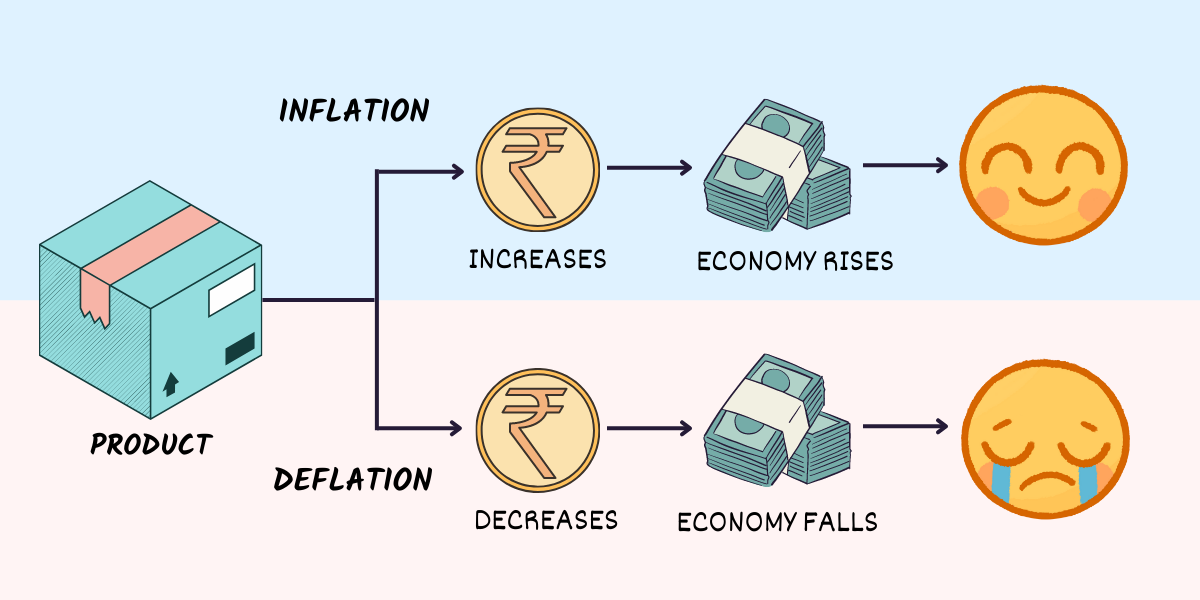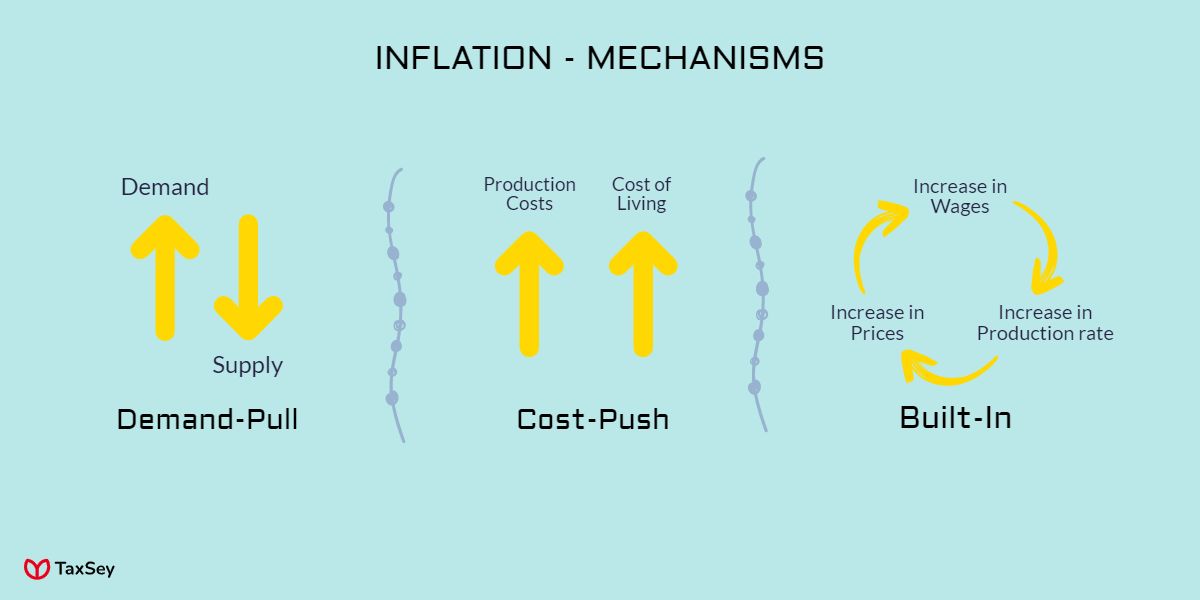Inflation - A complete guide
Price increases of commodities, the effects of price rises on the global economy are constant events throughout the world. The prices of the same goods vary according to economic conditions in different places.
This continuous rise in the price is referred to as inflation. Let’s look into the details and find out what causes inflation to occur in a country?
Inflation: Definition

It is not necessary for the price of a commodity to remain the same in an economic market. There will be a rise in their prices due to various reasons over the seasons and period of time.
On that note, inflation is generally defined as the rise in the price of the goods, commodities and services in an economic market. It is a measure to determine the cost variations that occur within an economy.
But there could also be other definitions and explanations for the term inflation. Using inflation as a metric, you can determine the value of a country's currency.
Alternatively, we can also define inflation as the decrease in the purchasing value of the currency of a country. When the value of goods increases, there will automatically be a decrease in the value of the currency.
What causes Inflation?

Generally when the price of a product increases, users refrain from buying that product. It is very common, as lifestyle changes lead to significant differences in price.
So what causes the sudden increase in price is the big question out here.
Vendors usually raise the price of a product when demand for the product is high and supply is very limited. Ultimately this leads to the dropping of the value of currency.
The same product will be cheaper in some other place, and so people will not show any interest in purchasing for a higher price. Consequently, if the price for all commodities increases, the value of the currency will decrease, resulting in the collapse of the economy of that country.
It's not that inflation of products happens simultaneously. This is determined by the businesses and vendors who are responsible for the sale of the product. But as soon as inflation rises, we can sense a decline in the economy.
Mechanisms that drive Inflation:

In general, inflation leads to a decline in purchasing power, which leaves people unable to purchase goods or services. This can be explained by looking at three mechanisms.
1. Demand-Pull Inflation: The demand for a particular product is large but the supply is small, which causes the price to rise. Generally economists call this "too many dollars chasing too few goods”.
This can also be due to the changes in the lifestyle. In this way, the product that wasn't a demand suddenly catches everyone's eye and everyone begins buying it. The suppliers have a very low supply and so they increase the cost, causing inflation.
2. Cost-Push Inflation: This is not due to demand or supply of the product. Cost-Push effect is caused by the increase in production costs of making a particular product. The reasons could be the rise in cost of,
- Raw materials
- Labour charges
- Additional manpower
- Increase in taxes
Due to these reasons there is a hike in the overall price of the product, to compensate for the increase in other factors.
3. Built-in Inflation:
Built-in inflation is a result of a cycle of events, that is in accordance with the future. The presence of past and present events has an impact on the future, which is emphasized by this mechanism.
A good example is the change in lifestyle. As a result, the current generation demands higher wages, which leads to a rise in production. An increase in product rates results in an increase in the cost of living and a decline in the economy.
A loop of events is interconnected, which leads to built-in inflation.
How to measure Inflation?
Measuring inflation plays an important role in knowing the economic growth of the country. Before that, there are certain indexes that we must understand to measure inflation.
Price indices are used to determine the average cost of goods and services. The commonly used price indexes are,
a) Consumer Price Index (CPI):
This is the ratio of the cost of prices in the current period to the cost of prices in the previous or base period for a single product. By calculating CPI we can find the overall cost changes that has occurred over a period of time.
CPI consists of a basket of goods and services that act as the primary needs of society, which includes medical care, food, transport etc. CPI determines the changes that will occur in the cost of living in the future.
b) Wholesale Price Index (WPI):
Wholesale goods are products that are bought in large quantities, so this index measures the changes in wholesale goods. Raw materials for these products are purchased in bulk quantities.
Inflation or changes in raw material costs are determined by calculating the wholesale price index. Cost production rate is the difference between the cost production rate and the retail rate.
Now the calculation of inflation,
Inflation rate = (Final CPI value/ Initial CPI value) x 100
Therefore, when the CPI increases, the inflation rates also go up.
Effects Of Inflation:
Inflation leads to some adverse conditions in the living and economy of the country. Highlighting few effects of inflation,
i. Decline of purchasing power:
A consumer's buying behavior is directly affected by inflation. Increasing prices will reduce the purchasing power of consumers because the same commodity was cheaper before.
The money in their hand will have no value or power when there is a significant rise in the cost of the goods. The primary living of the people will be affected to a great extent.
ii. Lower income people are affected:
Inflation does have equal effects on the overall people and consumers. As a result, the lower salaried population is highly affected by this effect when compared with their income and wages.
This happens because, the overall cost of living increases but the income gained remains the same. There will even be a shortage of essential goods, and people will not be able to satisfy their basic needs.
iii. Deflation never occurs:
It is generally expected that the price of commodities will decrease after a certain period of time. This is known to be deflation. For deflation to occur, the expectations of consumers need to be fulfilled.
When there is constant inflation occurring over a period of time, deflation cannot occur. As the price of goods rises, the supply does not keep up with the demand of people, causing a reduction in standard of living.
iv. Value of currency decreases
When the price of commodities goes up, the value of currency goes down. This is related to the economy of the country. When the value of currency declines it automatically has a great effect on the economic market.
When there is no value in the currency, people won't be able to buy products as efficiently. The other countries will start dominating when the economy drops down.
v. Assets are degraded:
People who own assets such as land, houses, and property lose the value of them over time. The value of what they bought will be much higher when they sell it. There will be no profit or gain from the assets they hold.
vi. Business gets affected:
As a result of inflation, raw materials become more expensive, which affects businesses. When there is inflation in a country, business firms must decide, plan and research according to uncertain situations.
Since the value of currency has decreased, and investments have yielded no returns to investors, making investments will be difficult.
Conclusion:
So is inflation a good sign or not?
Well at different perspectives there are some advantages when there is an inflation in the economic market. Generally an overall inflation of 2% every year is acceptable on certain goods and services.
This rise in price will be due to the economic growth. When there is also a continuous deflation occurring, there won’t be any income for the government which also leads to the decline of economic growth.
The above stated reasons are the result of uncontrollable inflation in the costs of products and services. The price of the goods goes up every date because the customers and people needs aren’t satisfied.
Imagine if the inflation occurs in every primary commodities. There will be no chance for living in a costlier economy and that’s why inflation must occur at a controlled manner, which is also monitored regularly.
Frequently Asked Questions
Inflation is a rise in prices, which can be translated as the decline of purchasing power over time.